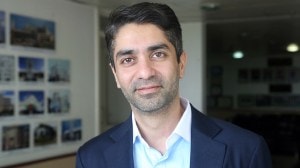HEART MATTERS
Post-surgery sex is not risky for heart patients. Just play it safe.

Architect mahesh Atre8217;s physician was impressed with his speedy recovery after a stroke. He was back in shape within a month and not much had changed except for the equation with his wife, Nisha. She distanced herself physically just to be on the safer side. While Nisha was trying to play safe, Atre was bogged down with the burden of being sick. 8220;They were in a complete mess when I counselled them. More than Atre8217;s illness, the tension was due to the lack of awareness and communication gap,8221; says psychiatrist Dr Samir Parikh, HOD, mental health, Max Healthcare Hospital, New Delhi.
Mahesh and Nisha are no exception. Studies have shown that almost all heart patients are worried about their future sex life. 8220;Their fears and doubts are often not clarified by physicians and in the absence of proper guidance, both the patient and the spouse rely on their own knowledge and myths to cope with fears of sexual inadequacy, impotence and death during intercourse,8221; says Dr Vidya Suratkal, consultant cardiologist, Lilavati Hospital, Mumbai.
While the fear factor remains the same, there are differences between the problems faced by men and women heart patients. 8220;Men usually report a reduction in frequency and satisfaction during intercourse after a heart surgery. Sex drive may decrease, leading to failure of erection. There are also chances of premature ejaculation. Women resume sexual activity much later and a significant number never do so,8221; says Dr Peeyush Jain, HOD, preventive cardiology, Escorts Heart Institute and Research Centre, New Delhi. Interestingly, almost 40 per cent of men and three out of four women complained of similar frigidity even in the absence of any coronary illness.
One of the major areas of concern is the amount of physical strain during sexual intercourse. Experts say that sex does not put much physical strain on the heart. According to a study, where a Holter monitor was used to record the ECG of couples during sexual intercourse, the act has only a moderate affect. 8220;Rises in heart rate also occur for a brief period during stair climbing and brisk walking,8221; said the study.
Though sex after recovery is not risky for heart patients, Dr Jain suggests some practical tips to regain a normal sex life:
Time to resume sexual intercourse: This depends on factors like general health and physical stamina prior to illness, strength of heart muscle contractions, frequency and severity of angina, ability to resume normal physical activity and wound healing. It is best to resume when one can climb two flights of stairs without breathlessness, say four to six weeks following an uncomplicated stroke, and a little later after surgery.
Getting started: Cuddling without worrying about performance is desirable. Touching and caressing without penetrative sex and orgasm needs less energy.
Don8217;t skip the foreplay: Foreplay allows a gradual rise in heart rate. Room temperature should be comfortable as extreme temperatures are stressful for heart.
Desirable positions: After heart surgery, it8217;s best to take positions that impose least strain on the chest wound and permit free breathing. Supporting the body on hands, when on top should be avoided. This position involves a lot of isometric exercises, which may be strenuous. Partial support on the elbows and forearms is better.
Do not panic: Fast breathing, sweating and palpitation are normal signs of arousal.
Things to avoid: Refrain from intercourse for two hours after a heavy meal. While two small drinks prior to the activity are permissible, excess of alcohol should be avoided. Severe palpitation persisting beyond a few minutes of orgasm or its recurrence may be alarming. If sexual intercourse precipitates severe angina or breathlessness more than once, or when even modest physical exertion precipitates irregular heartbeats, it is desirable to resume sexual intercourse after optimisation of medical therapy. Contraceptive pills are off limits forever as they lead to blood clotting. Be careful during pregnancy after heart valve replacement.copy;
- 01
- 02
- 03
- 04
- 05































